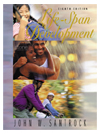 |  Life-Span Development, 8/e John W. Santrock,
University of Texas - Dallas
The Life-Span Development Perspective The Science of Life-Span Development
Chapter ObjectivesI.Define and distinguish between theory, hypotheses, and the scientific method. |
 |  |  | II.Compare and contrast Freud's psychoanalytic theory with Erikson's psychoanalytic theory. |
 |  |  | III.Describe Piaget's theory of cognitive development and explain how it differs from Vygotsky's sociocultural cognitive theory and the information-processing approach. |
 |  |  | IV.Understand the basic principles underlying the behavioral theories. |
 |  |  | V.Understand how social cognitive theory has been modified in recent years. |
 |  |  | VI.Describe the basic concepts from ethological theories. |
 |  |  | VII.Consider how Bronfenbrenner's ecological theory is similar to and different from social cognitive theory. |
 |  |  | VIII.Describe what is meant by an eclectic theoretical orientation. |
 |  |  | IX.Describe the different research measures used by developmental psychologists. |
 |  |  | X.Compare and contrast the correlational and experimental strategies for collecting information scientifically. |
 |  |  | XI.Define independent variable, dependent variable, and random assignment, and explain why causal conclusions cannot be made from correlational studies. |
 |  |  | XII.Describe cross-sectional, longitudinal, and sequential approaches to research, then define cohort effects and their role in each type of study. |
 |  |  | XIII.Grasp the basics of understanding professional journal articles. |
 |  |  | XIX.Understand the standard ethics of developmental research. |
|



 2002 McGraw-Hill Higher Education
2002 McGraw-Hill Higher Education